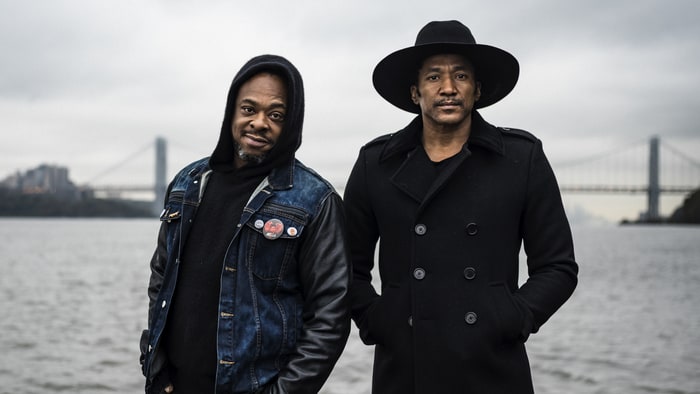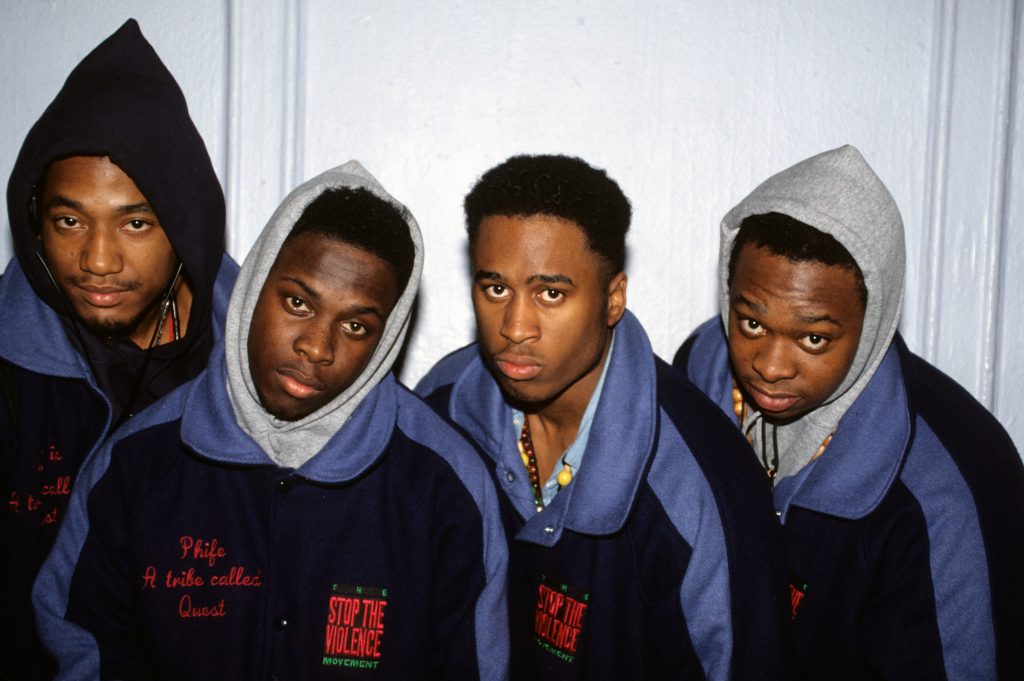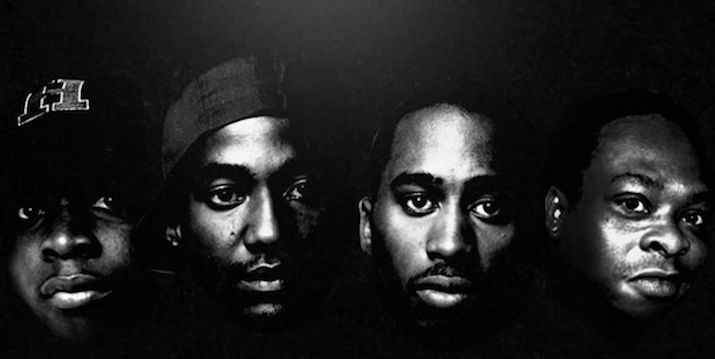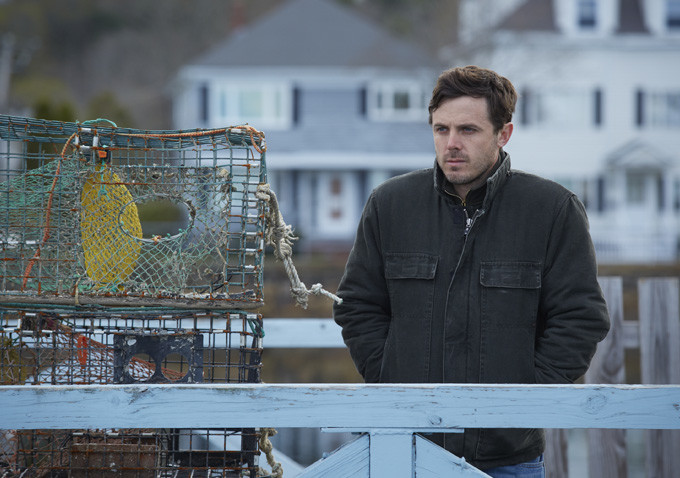Alex writes about how Manchester by the Sea reframed his opinions on A Tribe Called Quest.
There’s a sensation that happens every time I see a movie I really like for the first time, a sensation I have never quite gotten to the bottom of. Walking out of a theatre, the world sounds clearer. Auditory details that I wouldn’t have recognized two hours previous have somehow become prominent. The world is more in focus, because this movie made it so. I remain uncompelled to put my headphones back on, unmotivated to leave this feeling behind just yet. I prefer to listen to the world a movie revealed to me.
The most recent time this happened was after seeing Manchester by the Sea, Kenneth Lonergan’s most recent film. I walked out of the theatre distinctly aware of sounds I had previously ignored: crumpled popcorn bags being discarded, the rolling out of the cinema equivalent of a velvet rope, and erroneous chatter about visiting Wichita in February. This continued as I caught the subway to my afternoon gig, as sliding doors and gum wrappers were somehow audible amidst the metropolitan chatter.
Eventually this feeling, like all good things, wears off. The sounds of the world dim again, and I become bored with the static noise of living in a city, leading me to restore headphones to my cranium and resume the record I was listening to on the way to the theatre.
This is going to make no sense, because this is a piece you might currently think is about Kenneth Lonergan and I’m about to start talking about A Tribe Called Quest. This is illogical, because Lonergan probably has no interest in Black Spasmodic (outside of perhaps appreciating the use of the word “spasmodic”). At no point during Manchester by the Sea did I think, “Oh wow, this reminds me of that time a popular rap group made a song about not eating ham and eggs because of their cholesterol levels,” and anybody that tells you they did is a liar.
But, I digress.
I have spent a lot of time listening to the new A Tribe Called Quest album in recent weeks. Their haphazardly titled final record, We Got it From Here… Thank You 4 Your Service, is an enjoyable experience. The production is occasionally stunning, multiple songs contain an energetic Busta Rhymes, and it includes a couple of songs featuring emcees casually bouncing lines back and forth at each other. It is a contribution to hip-hop from one of its golden era’s contributors, and it sounds like a record made by people influenced by hip-hop’s equivalent of the Greatest Generation (even if it doesn’t sound like an album from that time).
In the early 1990s, Q-Tip, Phife, Jarobi, and Ali Shaheed Muhammad put out a string of three albums that are widely (and rightly) regarded as hip-hop classics. People’s Instinctive Travels and the Paths of Rhythm, The Low End Theory, and Midnight Marauders are three exceptional records, rightly considered by history. ATCQ was a part of the so-called Native Tongues – whose most notable other members are the equally intriguing De La Soul – a collection of artists known primarily for rapping about topics that were not stereotypically discussed on 1980s rap records. (If you can imagine what N.W.A. songs make you think of, the exact opposite feeling is what listening to a Tribe record sounds like.) Their lyrics were sometimes quaint in the way only youths have the capacity to be*, but also (mostly in the case of Tip) thoughtful in a way that wasn’t common in the genre. They still made songs about fucking, but they also made songs about STDs; rapping about wrappers is a decidedly unrapper thing to do.
*Q-Tip and Phife, the group’s lead vocalists, were twenty when their first album was released, an album that included a handful of songs recorded as much as two years earlier.
At the time, Tribe (and the other members of the Native Tongues) were a group that was trying to do things differently, even though it was the only way they saw things at all. There never seemed to be a focus on being unique; it just sort of came naturally. And their highest peak – depending who you ask, this is either The Low End Theory or Midnight Marauders* – was a moment worth remembering for hip-hop.
*I see both sides of the coin, but the clear answer is The Low End Theory. I have heard many hip-hop albums that remind me of Midnight Marauders in the twenty-three years since its release, but I have never heard anything that accurately recaptures the feeling of The Low End Theory.
Like so many artists, A Tribe Called Quest’s later work was shackled by the expectations brought on by what preceded it. Their fourth album Beats, Rhymes & Life is a good album, but it could never be as good as any of the three that preceded it, so it was seen as a failure. Their next (and until only recently final) album The Love Movement is widely viewed as garbage despite being mostly okay. That didn’t matter though; being mediocre is no longer acceptable when you have previously been exceptional.
When it was announced that ATCQ was putting out a new album mere weeks before We Got it from Here’s release, the news was surprising. Upon hearing that the group’s second most notable member, Phife, had been contributing to the record before he passed away earlier in the year, that surprise was amplified. It seemed impossible that a band of Twitter-addicted hip-hop superfreaks could be totally unaware of a new album from infamous luminaries that had been gestating for almost a year.
In my limited conversations with others (and my extensive message board perusing) about the new Tribe record, the feelings have been positive, albeit the sort of positive that comes with qualifications. The fan reviews seem to be that the songs Phife is on are great, while the rest sounds like a Q-Tip solo album. One of my dodgeball-playing pals was driven back to Q-Tip’s last solo album, The Renaissance, believing it to be more honest about itself. All of this is understandable, as the album was recorded (with the exception of Kanye’s brief appearance) seemingly entirely in Q-Tip’s home studio. There was a rule that everybody had to come through the studio in person, including Phife, who was flying across the country from his home in California to do so. Even with everybody present, though, the album still sounded like a reunion party Q-Tip was hosting (likely in some capacity because Ali Shaheed Muhammad couldn’t be present for the recording while working on the Luke Cage soundtrack on the west coast). The family was back together, but the listener could tell they were still apart.
When people want to understand the story of A Tribe Called Quest, the easiest direction to point them in is toward Michael Rappaport’s documentary on the group. Beats, Rhymes & Life: The Travels of a Tribe Called Quest is a very good music documentary, sticking to the formula of pretty much every other music documentary ever released but still aptly telling the story of a group of hip-hop luminaries. The film is simultaneously a brief history of Tribe and a document of some of Q-Tip and Phife’s arguments on the 2008 Rock the Bells tour. It’s a fascinating document of anybody that used to be friends but can no longer stand each other (even when they’re being paid to), with Ali playing the role of Kirk Hammett, the quiet, reserved guy that wishes all the fights would stop.
A telling moment comes in the second half of the movie, as Rappaport interviews Dave and Posdnuos (of De La Soul) about whether or not they are witnessing the final show of ATCQ as a group. The pair of plugs tellingly say that they hope it is, if only so they don’t have to watch their longtime friends fight in front of them. This didn’t end up being the case; the film closes with a tour in Japan, and later the Yeezus tour brought ATCQ back together, as did a Tonight Show appearance. Tribe weren’t quite done, it seemed. The film ends with a text graphic saying the group still has one album remaining on their original record deal, a graphic that now makes the decidedly non-prophet Rappaport look prophetic.
As I sat on a subway car, listening to We Got it From Here yet again, I started to hear it a bit differently. I couldn’t put my finger on what exactly didn’t work for me initially, but I had started to sort it out. I flat out don’t like the song with Andre 3000, nor the obligatorily mournful (but still kind of corny) Lost Somebody. Kanye’s hook on The Killing Season is a real problem. But mostly these realizations were positive, it merely took a little time to realize that this was the first time I was listening to a Tribe album within as little as ten years of its original release.
When I was beginning my seemingly never-ending tour through the illegally downloaded halls of hip-hop history, it became clear that A Tribe Called Quest was one of the few hip-hop artists my high school friends actually liked. When I was in high school in the early 2000s, it was still uncommon for suburban white kids to be into non-Aftermath hip-hop music (even though pretty much every rapper I listened to at the time made better music than those bullshit Yellowcard albums my friends seemed to love so much). There were a few artists that seemed to be exceptions to the hip-hop hating crowd, and ATCQ was one of them. As such, many of my friends that only casually listen to hip-hop were curious to check out the Tribe’s newest release.
(It seems important to point out that – to critics and the informed – We Got it from Here was immediately well liked. But this is not the perspective I find the most interesting, because those are not people I get to talk to.)
When listening to We Got it From Here – with the exception of the back and forth verses – it sounds decidedly modern. The production is expansive with impressive depth, and the lyrics are explicitly political in a handful of songs. (The Space Program specifically becomes a much more depressing song given that it was released four days after the election.) To say some of the themes were “ripped from the headlines” is needlessly hyperbolic, but these lyrics are clearly written by people cognizant of the modern American social structure. This time though, Tribe’s album can’t sound like vintage Tribe because by the time a lot of us heard Tribe for the first time the music had already been aged.
Of course, Tribe as a group and individuals were always contesting with their past anyway. When you make something as successful – both critically and commercially – as Tribe’s first three albums were, your entire career will be viewed through the lens of what you created long ago. Ali can be the best podcast co-host in the world, but he will forever be known as a member of Tribe. Had Phife properly evaluated LeBron James’ basketball future when Bron was in preschool, it still wouldn’t have been as impressive as his introductory “YO!” on Buggin’ Out. I have never eaten at a Jarobi-run restaurant, but I can assure you I don’t like any food product more than I like Can I Kick It. Even Q-Tip – widely and properly seen as the star of the group – can’t release a solo album without it being compared to his work with the Tribe.
This is true not just of musicians, of course, but anytime a piece of pop culture returns to your life after a prolonged dormancy. Jason Bourne seemed like a worse movie than it actually was because The Bourne Ultimatum is one of the finest action films ever made. The return of Gilmore Girls seems to have similarly let some superfans down in a way that makes me think perhaps the final four words were “Rory isn’t my child.” As time grows between installments, you intertwine these cultural products into your life and make them mean more than they ever could on their own.
I first saw Kenneth Lonergan’s Margaret four years ago, when the director’s cut was finally released to home video. It was an astonishing film. I watched it once, and then I watched it again a couple days later. My opinion remained unaltered, and I frequently bring it up as one of my favourite modern films. As such, to see Longergan’s follow-up, Manchester by the Sea, was a loaded experience before I even got to the theatre. I was always going to compare it to Margaret, even though I had resigned myself to the fact that it was borderline impossible for Manchester to be better. Which it wasn’t, and that’s fine.
One of my favourite elements of Lonergan’s films is that what gets said just off-screen actually matters. Lonergan embraces the idea that there is a world outside of the one you currently inhabit, even when – since he is the writer/director of his films – he is creating this world from the bottom up. In Manchester by the Sea, Lee Chandler overhears others a handful of times, occasionally reacting to his eavesdropping with face punching. A woman overhears Lee at the marina, and upon his exit she encourages her coworker to avoid Lee in the future. We never see this woman again, but the idea is that she lives a life, as we all do, protecting her job because she’s concerned Lee doesn’t belong within it.
The most notable example of this in Manchester by the Sea is Kenneth Lonergan’s own cameo as the Canada Goose coat-wearer that sarcastically chides Lee for his parenting. After a brief exchange, Lonergan walks away. In any other film, this unnamed character walks offscreen and we don’t think about him for another second. In Lonergan’s, we get one more shot, a wide dolly shot that shows this man continuing on with his day, regardless of what Lee does. In Manchester by the Sea, there are no small people*, only small parts, and those unsmall people will occasionally get a dolly shot showing us that they continue to go about their day even upon leaving the orbit of the film’s leads.
*Lonergan pushed this idea to its furthest in Margaret, a movie about how listening to all the voices around you doesn’t necessarily make the world any more sensible.
No artist’s job is to please a pre-existing fan base; there are infinitely more examples of artists doing something new that gets embraced by cultural history than trying to recreate what we already had. The former comes when we trust others we don’t know to have good ideas on their own, while the latter is built around a selfish desire to be given exactly what we think we want (which is impossible). In these situations, we’re assuming we’re the world’s main character. In reality, we’re all the dude in the blue winter coat, simply going about our business.
When Beats, Rhymes & Life hit cinemas in 2011, I was legitimately excited to watch the story of a group I had loved for over a decade finally captured in the endlessly rewatchable format of the rock doc. As I sat down in my seat, I noted that the (admittedly small) audience seemed louder than an audience that is typically going to a 9pm showing on a Wednesday. When the movie started, that guess was proven incredibly correct in ways I could not have anticipated. As Tribe’s music started playing, it became clear that everybody in this theatre was going to rap along to it for the entirety of the movie. It remains one of the few examples of an instance where the louder the audience got, the more I enjoyed the movie.
Like when I saw Manchester by the Sea last week (in a decidedly quieter environment), the movie ended, and we all walked out of the theatre into the world. I don’t know what anybody in either screening really thought about the film, although I feel like I can confidently guess the opinions of those at the Tribe doc. I never got to know those people, and I never will. They left the theatre and went about their lives. Perhaps my fellow Lonergan heads felt his new film didn’t live up to their expectations, that he could never top Margaret. Perhaps the Tribe followers felt Beats focused too much on squabbles and not enough on their recording process. I would be curious to hear any and all of these opinions, but I never will, so I shall continue on without them.
The older I get, the less the world makes sense. I can now be walking along with a friend I’ve known for a decade, and I express concerns about a potential New Year’s party that she would have immediately understood years ago, but since I poorly explained said concerns I will now feel embarrassed about it for the next six years. What was once a shared language has become a fumbled attempt at understanding. Tribe became a group of people that didn’t understand each other as well as they once did, and as such their music doesn’t sound like it did when they were on the same wavelength. They were simply people living their lives, continuing their existence in a way only they could, wholly outside of our orbit.
Lonergan understands this, knowing that everybody occupies their own space. Sometimes we agree with what happens in spaces other than ours, and sometimes we sarcastically give Casey Affleck shit for his parenting skills. But more than anything, Lonergan’s films enforce the idea that the nonunderstandable people are still worth listening to, worth trying to decipher. That’s where the answers are.








